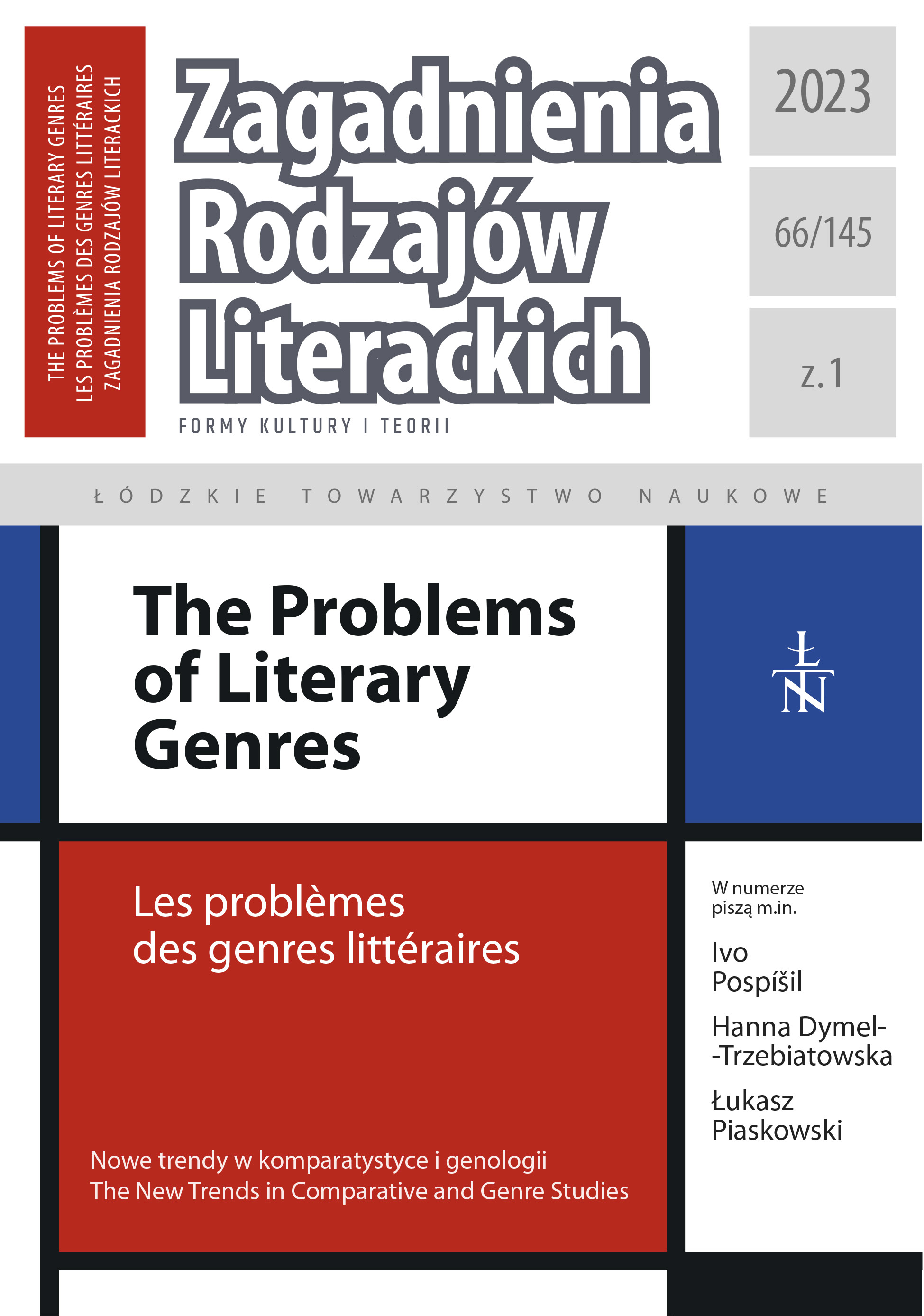Current Geopolitical Processes as a Methodological Opportunity for (Literary) Imagology
DOI:
https://doi.org/10.26485/ZRL/2023/66.1/10Słowa kluczowe:
imagology; Russian literature; Czech literature; imperialism; post-imperialism; neo-imperialism; stereotype; brandAbstrakt
The article proposes a hypothesis that traditional imagological concepts are no longer sufficient for interpreting the current and recent “imagological situation”. The authors argue that given the significant changes in the geopolitical ordering of the world in the post-imperial period, it is necessary to expand and internally categorize the terms to capture a more nuanced way of looking at the “other”. The article provides a summary of existing approaches and suggests innovations, particularly in making a careful distinction between the self-image of the internal and external, and the disaggregation of the “meta-image” into several layers. The authors point out that imagological research needs to consider that the ethnic identity of the recipient is not unambiguous, which problematizes the interrelation of “us” and “them”. Additionally, in post-imperialism, there is an unravelling of the former bipolar perception. The authors trace the image in the context of concepts such as image, stereotype, and brand. The essay aims to analyse the manifestations of the emerging neo-imperialism, which returns to the traditional contrasting delineation of “our” and “the foreign”. It also examines the factor of evaluation and the question of fictionality. The effectiveness of the new approaches is demonstrated in a Russian-Czech comparative analysis of selected novels by Vladimir Sorokin and Jáchym Topol. The authors perceive the current geopolitical processes as an opportunity for improving the imagological methodology and imagology as an effective tool for interpreting the contemporary world.
Liczba pobrań
Bibliografia
Allport Gordon W. (2004), O povaze předsudků, trans. E. Geissler, Prostor, Praha.
Beller Manfred J., Leerssen Joep T. (2007), Imagology: The Cultural Construction and Literary Representation of National Characters: a Critical Surve, Rodopi, Amsterdam–New York.
Bhabha Homi K. (2000), Die Verortung der Kultur, trans. M. Schiffmann, J. Freudl, Stauffenburg, Tübingen.
Dyserinc Hugo (1996), Zur Entwiclung der komparatistischen Imagologie, „Colploquium Helkveticum“ no. 7, p. 19–42.
Corbineau-Hoffmann Angelika (2008), Úvod do komparatistiky, Akropolis, Praha.
Chepkasov Artur V. (2017), Imidzh, obraz, stereotip, brend, reputaciya: skhodnoye i specificheskoye, „Russkiy yazyk za rubiezhom“ no. 5, p. 74–82.
Fukuyama Francis (2002), Konec dějin a poslední člověk, trans. M. Prokop, Rybka Publishers, Praha.
Hausbacher Eva (2000), Poetik der Migration, Transnationale Schreibweisen in der zeit-genössichen russichen Literatur, Stauffenburg, Tübingen.
Iličeva Ludmila, Komarovskij Vladimir, Prorok Vladimír eds. (2013), Rusko ve 21. století: politika, ekonomika, kultura, Vydavatelství a nakladatelství Aleš Čeněk, Plzeň. Imagologica.eu [online] [cit. 20.03.2017], www.imagologica.eu [access: 5.05.2023].
Iovu Elisaveta (2020), The history of imagology: The three stages of evolution, „Journal of Romanian Literary Studies“ no. 20, p. 1012–1023.
Konstantinović Zoran (1988), Vergleichende Literaturwissenschaft: Bestandsaufnahme Und Ausblicke, Peter Lang Verlag, Bern–New York–Frankfurt am Main.
Leyens Jacques-Philippe, Yzerbyt Vincent, Schadron Georges (1994), Stéréotypes and Social Cognition, SAGE Publications, London.
Košťálová Petra (2012), Stereotypní obrazy a etnické mýty. Kulturní identita Arménie, Sociologické nakladatelství (SLON), Praha.
Mehnert Elke (2007), Russische Ansichten — Ansichten von Russland. Festschrift für Hugo Dyserink, Peter Lang Verlag, Frankfurt am Main.
Mehnert Elke (1997), Imagologica Slavica, Peter Lang Verlag, Franfurkt am Main. “Przegląd Wschodnioeuropejski“ (2020), no. 2.
Sanchez-Mazas Margarita, Licata Laurent (2004), L’autre: regards psychosociaux, Presses universitaires de Grenoble, Grenoble.
Sorokin Vladimir (2006), Den´ Oprichnika, Zagarov, Moskva, www.loveread.ec/read_book.php?id=49832&p=1 [access: 5.05.2023].
Sorokin Vladimir (2013), Teluria, Corpus, Moskva, www.fantasy-worlds.org/lib/id29283/read [access: 5.05.2023].
Sorokin Vladimir (2017), Manaraga, Corpus, Moskva, www.fantasy- worlds.org/lib/id25703/read [access: 5.05.2023].
Sorokin Vladimir (2021), Doktor Garin, Corpus. Moskva, www.fantasy-worlds.org/lib/id31986/read [access: 5.05.2023].
Soukup Daniel (2006), Stereotypy, imagologie a literární hodnoty [in:] S. Fedrová, Otázky českého kánonu. Sborník příspěvků z III. kongresu světové literárněvědné bohemistiky (sv. 1), Praha, p. 622–630.
Todorov Tzvetan (1996), Dobytí Ameriky: Problém druhého, Mladá fronta, Praha.
Topol Jáchym (2017), Citlivý člověk, Torst, Praha.
Topol Jáchym (2005), Kloktat dehet, Torst, Praha.
Topol Jáchym (1994), Sestra, Torst, Praha.
Ulbrechtová Helena (2015), Putinovo Rusko: posthistorie, nebo nová totalita? Reflexe neoimperiální situace v současné ruské literatuře [in:] Ruské imperiální myšlení v historii, literatuře a umění Tradice a transformace, eds. H. Ulbrechtová, M. Kusá, Slovanský ústav, Praha, p. 271–312.
Uriadova Anna (2020), The historical imagology: subject and object of perception, “Przegląd Wschodnioeuropejski“ no. 2, p. 167–174.
Vlachová Klára, Řeháková Blanka (2004), Národ, národní identita a národní hrdost v Evropě, „Sociologický časopis / Czech Sociological Review“ no. 4, p. 489–505.
Voltrová Michaela (2015), Terminologie, Methodologie und Perspektiven der komparatistischen Imagologie, Frank&Timme, Berlin.
Zelenka Miloš (2018), K teórii komparatistickej imagológie (úvodmé tézy) [in:] Imagológia jako výskum obrazov kultury, eds. M. Zelenka, L. Tkáč-Zabáková, Univerzita Konštantína Filozofa v Nitre, Fakulta stredoeuropských študií Ústav stredoeuropopských jazykov a kultúr, Nitra.
Pobrania
Opublikowane
Jak cytować
Numer
Dział
Licencja
Prawa autorskie (c) 2023 Łódzkie Towarzystwo Naukowe i autorzy

Utwór dostępny jest na licencji Creative Commons Uznanie autorstwa 4.0 Międzynarodowe.







